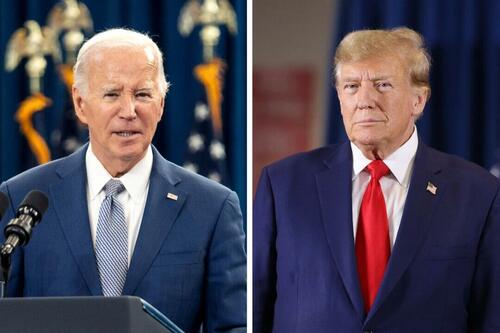CNN Announces New Rules For Trump–Biden 2024 Presidential Debate
Authored by Tom Ozimek via The Epoch Times (emphasis ours),
CNN has announced new details of its finalized rules for the first presidential debate of the 2024 election cycle, which will see a rematch between President Joe Biden and former President Donald Trump.
The network revealed on June 15 that the debate will last 90 minutes and will include two commercial breaks during which the candidates will not be able to interact with their respective campaign staff.
The candidates will appear at a uniform podium, with a coin flip to determine their podium positions.
No pre-written notes or props will be allowed, but the candidates will have a pen and paper so they can take notes during the debate.
There will be no studio audience for the debate, which will be held in Atlanta on June 27.
The debate will be moderated by CNN’s Jake Tapper and Dana Bash, who the network said “will use all tools at their disposal to enforce timing and ensure a civilized discussion.”
The candidates will each be given a bottle of water.
‘Not Impossible’ for RFK Jr. to Qualify
CNN also said that a condition for participation in the debate is that the candidates must obtain at least a 15 percent share in four separate national polls from a list provided by the network. They also must appear on a sufficient number of state ballots to be able to reach the 270 electoral vote threshold needed for a candidate to win the race for the White House.
The network said it’s “not impossible” for independent presidential candidate Robert F. Kennedy Jr. to meet these conditions, given that he has met the 15 percent threshold in three qualifying polls and, per CNN, is on the ballot in six states, making him eligible for 89 electoral votes.
Mr. Kennedy’s campaign said in a June 14 statement that he is on the ballot in eight states and has collected enough signatures needed for ballot access in a total of 22 states, which would total 538 electoral votes.
Still, CNN said that it appears “less likely” that anyone other than President Biden and President Trump will satisfy its conditions, setting the stage for a repeat of the 2020 showdown between the two men.
The Kennedy campaign didn’t return a request for comment regarding CNN’s remarks that it’s unlikely he’ll qualify for the debate, as well as for clarification on the ballot access figures, by press time.
Mr. Kennedy has said repeatedly that he expects to satisfy CNN’s requirements. He filed a complaint with the Federal Election Commission on May 28, claiming that CNN collaborated with the Trump and Biden campaigns to keep him off the debate stage.
A CNN spokesperson told The Epoch Times on June 12 that Mr. Kennedy does not currently meet the criteria for debate eligibility, while defending the conditions as “objective” and set before invitations were sent out to campaigns to participate.
Independent presidential hopeful Cornel West, Green Party nominee Jill Stein, and Libertarian Party nominee Chase Oliver remain far from CNN’s debate qualification guidelines.
So far, the Trump and Biden campaigns have agreed to two presidential debates—the first one hosted by CNN on June 27 and the second one by ABC News on Sept. 10, for which a location has not yet been decided.
ABC News’s conditions for debate participation eligibility are basically identical to CNN’s, with candidates having to appear on a sufficient number of state ballots to reach the 270 electoral vote threshold, receive at least 15 percent in four separate national polls, and agree to the debate format.
The two rival campaigns have bypassed the traditional process run by the Commission on Presidential Debates and have arranged their own debate schedule.
In November 2023, the commission proposed three presidential debates (on Sept. 16, Oct. 1, and Oct. 9) and one vice presidential debate scheduled for Sept. 25.
Both campaigns separately notified the commission that they prefer earlier debates.
In a May 1 statement, the commission defended its scheduling of debates, arguing that the first debate—scheduled for Sept. 16—would be the earliest televised general election debate ever held.
Jeff Louderback contributed to this report.
Tyler Durden
Mon, 06/17/2024 – 15:25
via ZeroHedge News https://ift.tt/s2gkZT7 Tyler Durden
